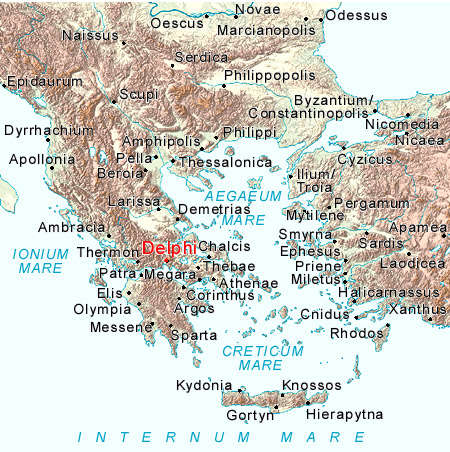| |||||
|
| Reservations |
|
| There was something 'magical' in Delhi for several thousand years. And today Delphi is the most popular archaeological site in Greece after the Acropolis in Athens. Lying on the slopes of Mount Parnassos, the majestic ancient site of Delphi overlooks the Gulf of Corinth and a valley filled with olive and cypress trees. The centre of Delphi was and is the sanctuary of Apollo on the southern tip of the mountain slope. The walls of that Doric temple were inscribed with wise words such as "Know Yourself", "Nothing in Excess", and "Don't take any Wooden Drachma". In the temple lived he priestess Pythia, who seated on a tripod above a deep crevasse that fumes got up from, pronounced many prophesies. Map of ancient Greece
|

|
|
The oracle, dedicated to the sun god ApolloDelphi was the place of the oracle of the sun god Apollo. He foretold the future through his priestess. She was known as the Pythia, and responded to questions of visitors while in a trance over rising sulphur damps or something like that. Her quizzical cries at the time were interpreted and written down by an official interpreter. In earlier times it was done in hexameter verse, then later in prose. The oracular responses were notoriously ambiguous, and their interpretation was often 'deduced' only after the event they referred to. That did not deter visitors from journeying to Delphi from all over the Mediterranean. Apollo shared the sanctuary at Delphi with Dionysus. Every fall Apollo departed for his winter quarters in the land of the Hyperboreans, the fabulous land far away in the North. In his absence the Pythia did not deliver oracles, and Dionysus ruled over Delphi. That's what they tell. During the 8th and 7th centuries BC, the sanctuary grew in prestige as it received splendid dedications from legendary kings such as Midas.
Its cultural role expanded in the 7th century BC, when the Pythian games attracted
athletes and musicians from all over the Greek world for games or competitions. This
festival, which originally took place every eight years, was expanded after the first Sacred
War and held every four years on a scale that rivalled the Olympic games. By these things
Delphi sustained the idea that it was the navel (omphalos) of the Greek world, a place where
ancient visitors could ritually cleanse themselves to go to the sanctuary of Apollo by
climbing a zigzag Sacred Way lined with treasuries and monuments till they got to the
temple where Pythia sat on Apollo's tripod to deliver her oracle responses.
King Croesos
The Greek historian Herodotus tells that King Croesus (Greek Kroisos) of Lydia - the ancient land of western Anatolia - was the first person to mint gold and silver coinage, Reputedly fabulously wealthy, Croesus is said to have given great treasures to the oracle at Delphi and other places. Convinced of her powers, Croesus then posed the question that really interested him: If he attacked the rival kingdom of Persia, would he be able to defeat its army? Pythia replied,
"When Croesus has the Halys crossed, a mighty empire will be lost." Cyrus and CroesosCroesus enjoyed his wealth as best he could in spite of Solon until he was defeated by the Persian king Cyrus, who attacked and captured King Croesus' capital, Sardis. The historians, Heredotus and Xenophon, say that Cyrus condemned Croesus to death by fire. The pyre was prepared and Croesus tied to a stake at the top. Cyrus ordered a torch to be applied and with barbaric cruelty watched it mount towards the man in the middle. Money couldn't help him at that point. But then there came a sudden, heavy rainstorm which put out the fire. And since Croesus at that moment uttered the name of Solon, the Persian king who allegedly admired the Athenian lawgiver, had Croesus cut down and set free. The ancients say it was the sun god that sent the rain. King Croesos Freed AesopThey say the Greek story-teller Aesop found favour at the court of King Croesus in Lydia, the ancient kingdom in West Asia Minor. Aesop told stories for men and women, and not everyone liked to be demasked by animal portrayals of that kind. But King Croesus freed him because he liked his stories, and later used him as an envoy. SoGreek tales contain instructive lessons for men and women today too. Even though people did not always speak truth in antiquity, and even if they often had more than one version of this and that story, there are lessons embedded in many of them, such as in many fables of ancient Greece. Many lessons depend on how we understand the stories. There should be room for interpreting them in several ways, not just one. |
|
Bernstein, Peter J. 2004. The Power of Gold: A History of Obsession. Chichester, West Sussex: John Wiley and Sons. Flower, Michael A. 2008. The Seer in Ancient Greece. Berleley, CA: University of California Press.
Simpson, Michael, tr. 1976. Gods and Heroes of the Greeks: The Library of Apollodorus. Amherst, MA: University of Massachusetts Press.
|
| Section | Set |
 |
User's Guide ᴥ Disclaimer © 1998–2019, Tormod Kinnes, MPhil [Email] |